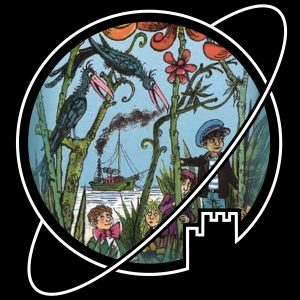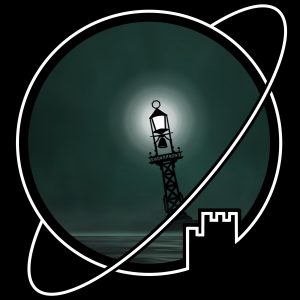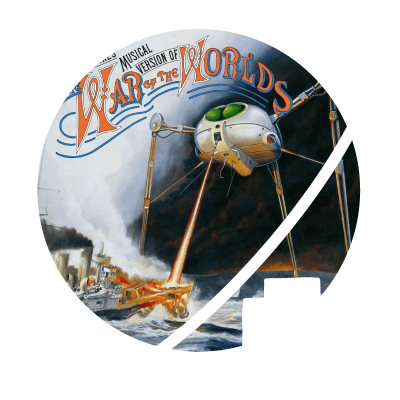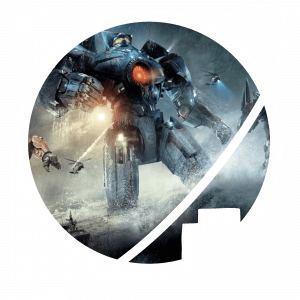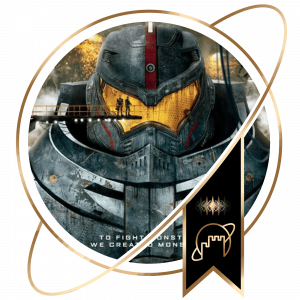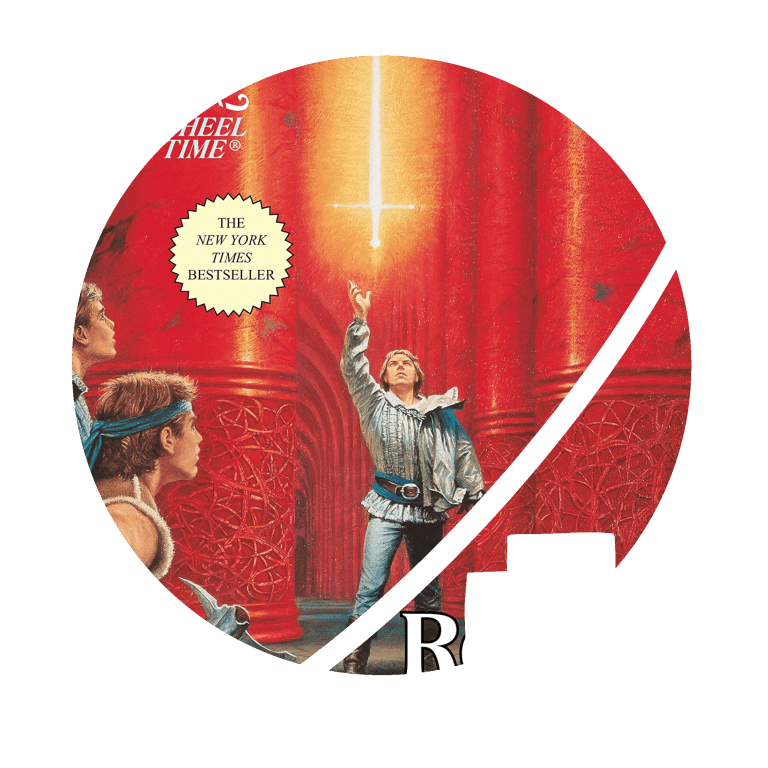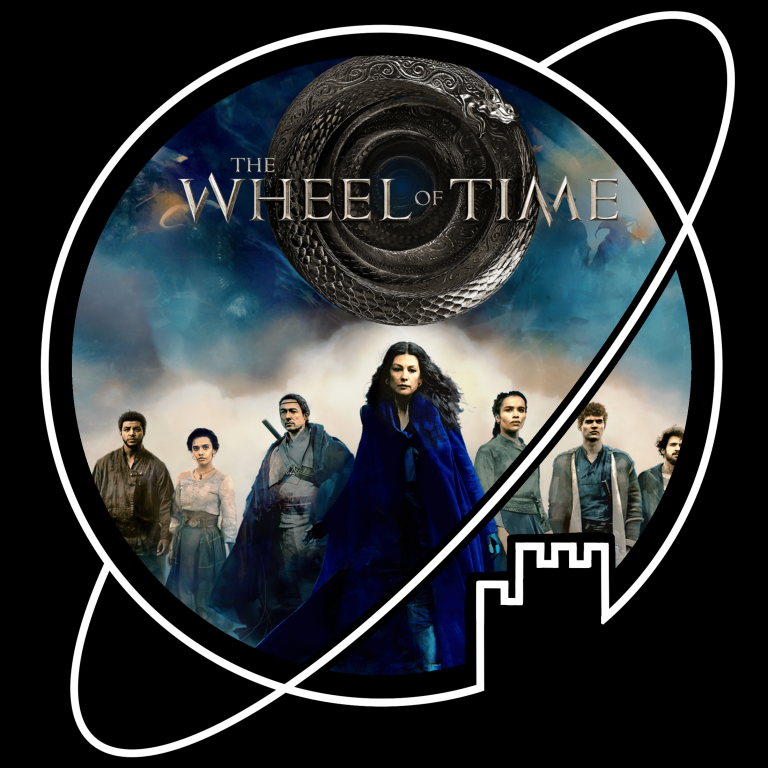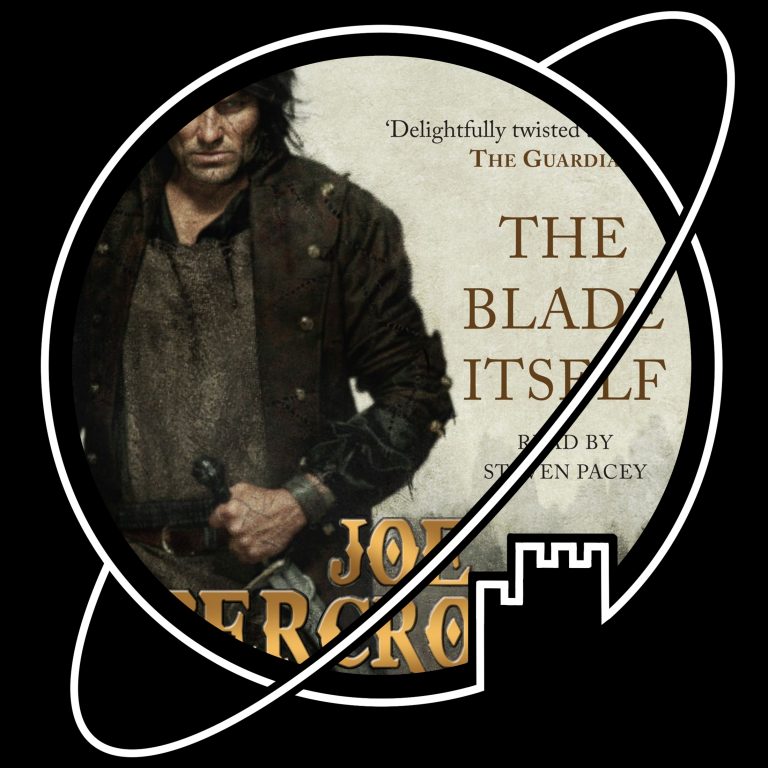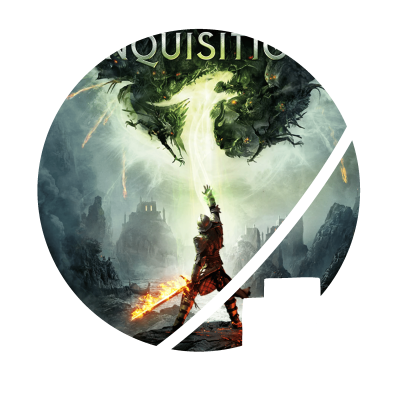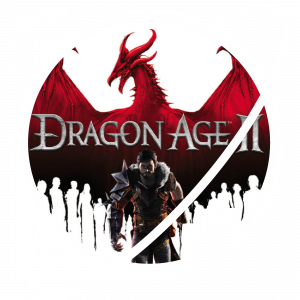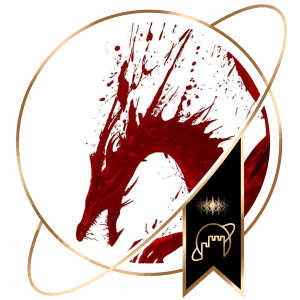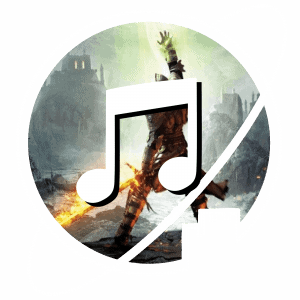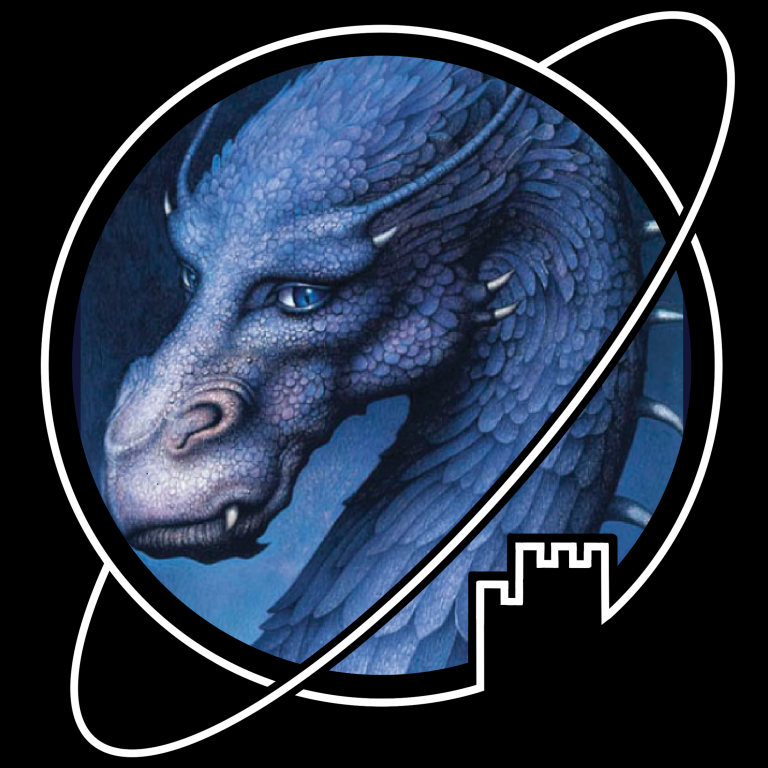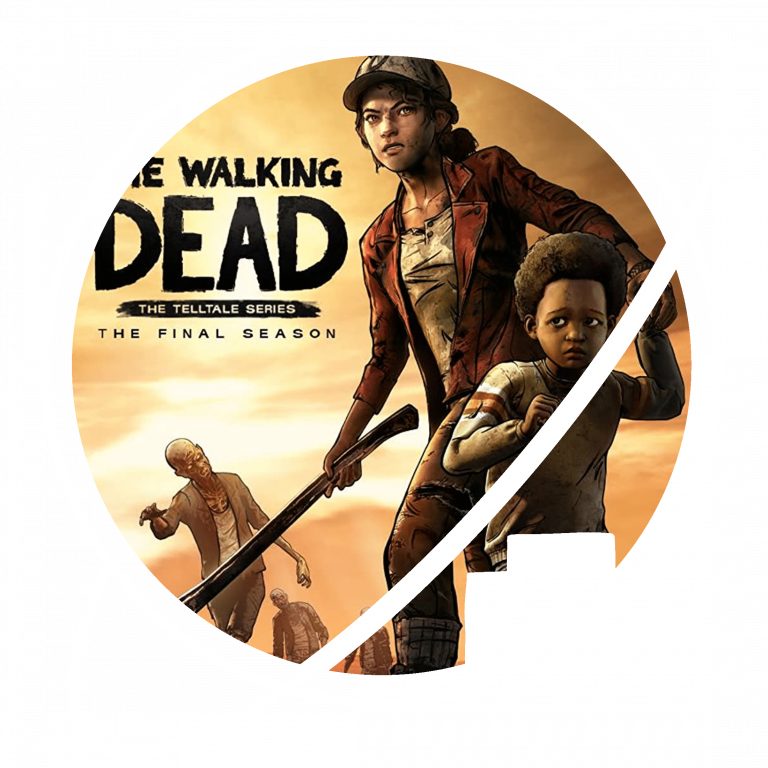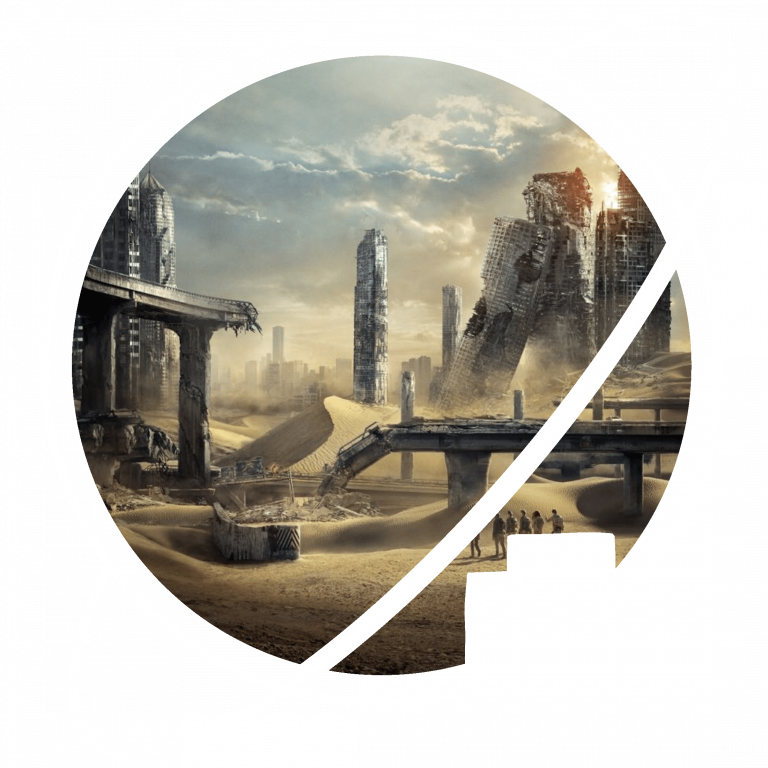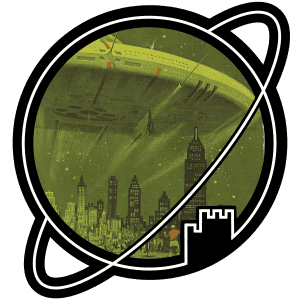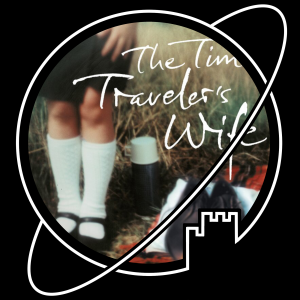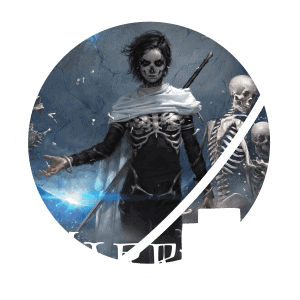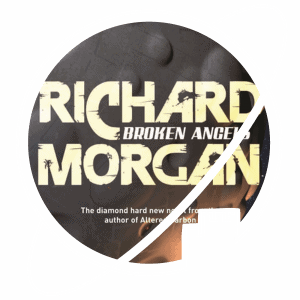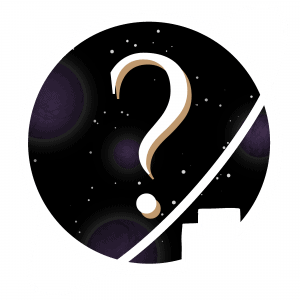A curated Collection of Fantasy and Science Fiction Media
Recent Updates
- Board game designed by Ignacy Trzewiczek
- Artwork by Tomasz Bentkowski and others
- Published by Portal Games
- Released in 2012
- 1-4 players
- Playing time: 60-120 minutes
In this cooperative board game, the players each take the role of a survivor stranded on an unexplored island. As you explore your surroundings, build up shelter, gather food and craft tools, hunger starts to set in and the weather turns bad. Will you achieve the scenario’s end goals, be they signalling a rescue ship or capturing a giant ape, or will the plucky survivors starve or be killed by the beasts of the jungle?
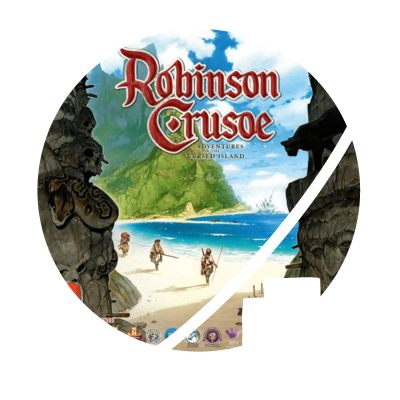

I love cooperative board games because playing them often feels like an even more social experience than when you’re playing against each other. The focus shifts from the game mechanics to the story and your collective imagination (in a way, what I’m saying is that I like table top roleplaying games :p). I think Robinson Crusoë does a great job of finding that middle ground between board game and storytelling, which means that there is something to like for everyone.
In Robinson Crusoë, the players are faced with a variety of threats, from gnawing hunger and fickle weather to various random events generated by drawing from a deck full of menaces. Playing safe is a guaranteed way to lose the game, so you are forced to take painful risks. But you know that few poor rolls can set you back a long way, so you’re constantly agonising (and discussing with each other) over whether or not to take those chances.
A chance-based game can sometimes feel random or unfair, but I’ve never felt that way playing Robinson Crusoë. That is not to say that the game does not get you to the edge of your seat – by some miracle of game design, every time I’ve played, winning or losing has come down to the final roll of the final turn of the game. That’s tension at its finest!
I’m treading the line of the speculative genre by reviewing Robinson Crusoë, because especially some of the simpler scenarios in the game are based in the titular, more or less grounded survival situation. But part of what makes this game great is that there is a variety scenarios: from simple shipwreck survival to Indiana Jones and King Kong spoofs – some even going as far as introducing time travel!
I haven’t played them all, but so far each scenario has been great, and the fact that there is constantly something new feels like a great excuse to meet up again and get in another game!
Tagged:
- Album musical composed by Jeff Wayne
- Released in 1978
- Starring Richard Burton, Justin Hayward, David Essex, Chris Thompson, Phil Lynott and Julie Covington
Jeff Wayne’s musical version of the War of the Worlds is an atmospheric musical retelling of the classic tale. It is the end of the 19th century, and green flashes have been seen coming from the surface of Mars. Ogilvy, the astronomer, has assured our protagonist, a Journalist, that no life could exist on the red planet. However, the next day they find a glowing cylinder that has crashed near town. A creature from Mars emerges from the cylinder and uses a heat ray to incinerate the spectating crowd. We follow the Journalist as he recounts the way the Martian invaders tear their way through the English landscape.

As far as I am concerned, Jeff Wayne’s Musical Version of the War of the Worlds is an absolute classic. I was ten years old when my dad woke me up by sneaking into my room and playing this record (I’m not that old lol – I just happened to have my mum’s old record player in my room). I didn’t understand English that well yet, but the music truly spoke for itself.
I happen to love musicals, but this isn’t quite that. It’s a sort of mix between a concept album and an audio play. The narrative is important, and the songs are great, but it’s the overarching musical themes that really shine. I could listen to an instrumental version of this record and it would still evoke the same emotions in me as it does with the narration and lyrics.
Every so often, they take the show on tour. The live show features a big orchestra and live performers, as well as some sick props, like a huge Martian Fighting machine that towers over the audience and shoots fire at you. If you ever get the chance to attend one of these, I heartily recommend it. A long time ago, an internet friend of mine went to see the live performance and I’ve rarely been more jealous. I did not have the money to spend on the show. The tickets were 70 euros, and I was very much 12 years old. It wasn’t until 2014 that I actually got the chance to see the show live. I convinced both my parents to come, and I managed to score 4th-row tickets. I’ve never been so incredibly surrounded by dads. Honestly, the arena was 90% men over 50.
I later told a colleague that it was kind of a bittersweet experience. You know – great show, just a shame I’d experienced the highlight of my life at age 20. Suffice it to say I’ve been trying to spread the word about this show among young people as much as I can. I was supposed to see the show again with Key, but unfortunately it was cancelled because of covid.
A couple of years ago, Wayne released a “New Generation” of the album – a newly recorded version. They made a couple of changes for this. Some of them are just musical updates that I quite enjoy. As with anything, there are a couple of things that were changed that I don’t love. There’s a short “cutscene” on the screen during the live show where the journalist and his fiancée Carrie talk to each other (except they’re not together really, so they just talk to… the moon? idk) and I find it deeply unnecessary and it pulls me out of the flow of the show. I don’t know why but it makes me go absolutely feral.
One of the more interesting things that they changed is that they really played into the popularity of Steampunk and gave the entire marketing of the show a Steampunk makeover. I have a complicated relationship with Steampunk – I find that it’s often a little tacky – but it really works for this story.
All in all, I would say there is nothing stopping you from checking out this album. It’s literally on Spotify. Next time you go to put on a podcast, play Jeff Wayne’s Musical Version of The War of The Worlds instead.
If you’re wondering if you should put on the original album or the New Generation, I would personally recommend the latter. It just goes a little harder. The original still slaps, though!
Tagged:
See also:
- Book written by Robert Jordan
- Published 15 November 1990
- Part 2 of the Wheel of Time series
When the Horn of Valere is stolen from Fal Dara right from under the eyes of its lord and the Amyrlin Seat (the head of the sisterhood of the Aes Sedai), Rand and the boys set out to get the Horn back alongside a party of Shienaran knights, while the girls travel to Tar Valon to start their training in the use of the One Power. Little do they know, however, that a new foe lurks beyond the sea…
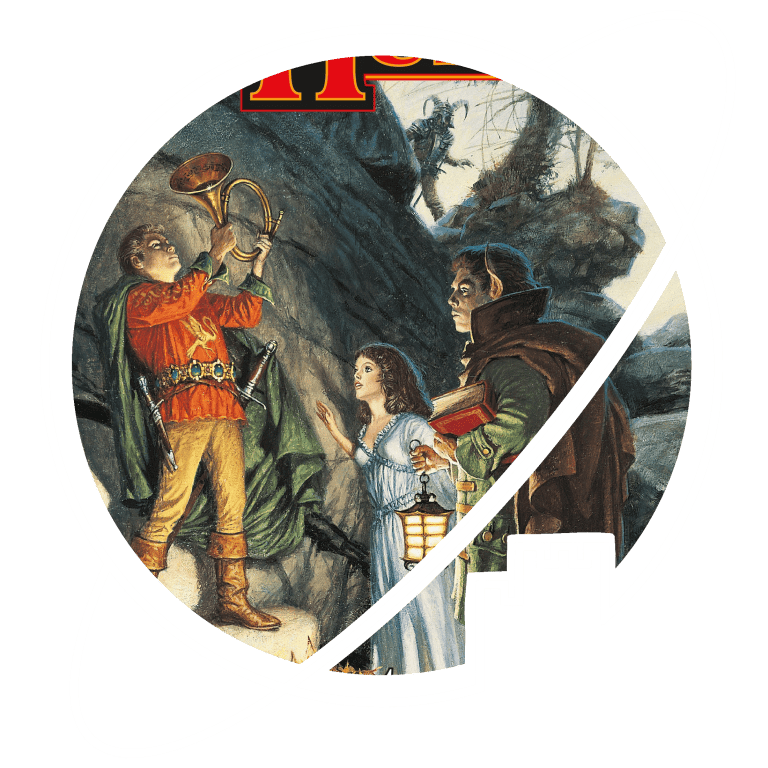
Another wonderful classic cover - look at that sneaky trolloc in the back!

Listened to the audiobook with Michael Kramer and Kate Reading (like the first book in the series) – fine narrators.
My opinion of The Wheel of Time didn’t really change after reading The Great Hunt. Essentially, I feel like The Wheel of Time is ultra-generic middle of the road fantasy that is comfortable, but not interesting.
The Great Hunt pretty much picks up where The Eye of the World left off. In the first few chapters, the bad guys steal the McGuffin and for the rest of the book the good guys and the bad guys variously chase one another as they nick the McGuffin off each other. In the end, the McGuffin overwhelms an otherwise perfectly good attempt by two female protagonists to save another (which was probably the best part of the book, which makes the development extra frustrating) – and so our main character Bland, eeeh, I mean, Rand, saves the day in the end.
Meh.
The Great Hunt is not bad, but there is just nothing that gets my heart pumping, no reason for me to recommend this over any of the other great options out there. And there is a lot in The Great Hunt that causes me to roll my eyes.
The Wheel of Time so far has probably the worst villains I have encountered in a fantasy book, maybe ever? Mean, low-spirited, overconfident, petulant – the villains have no purpose other than to be evil, they sound like spoilt toddlers, and it never feels like they are actually threatening to our heroes.
The main characters split up in the first half of the book (for one of the splits, for no other reason than that half of them are randomly teleported to another plane of existence?). As a result, the pace is rather slow as we jump around between their stories, and none of them get the love they deserve.
I really had to push through the first half of the book – I even started listening to some podcasts again for the first time in months simply because I didn’t feel like going back to the thinly veiled (and obviously hopeless) attempt at seducing Rand to the dark side.
Like in The Eye of the World, Nyneave is probably the only character with a recognisable personality (or more than one character trait). I would seriously struggle to give you a description of the other main characters’ motivations. And that is some fifty hours of listening into the story! I am not normally a reader that needs their story to be character-driven, but this…
Finally, one of my pet peeves with the book is that it fails to live up to its title in spectacular fashion. I could go on about what my imagination expected, but the core is that there is hardly a hunt, and it definitely isn’t great.
Overall, The Great Hunt has done nothing to convince me that The Wheel of Time is worth the time and effort it takes to get through. I will start up The Dragon Reborn one of these days but I already have a feeling that that won’t change my opinion either. Unfortunately, not all the classics can be winners.
Tagged:
See also:
- Video game developed by Bioware
- Directed by Mike Laidlaw
- Published by Electronic Arts
- Published November 2014
- Role-playing, Action
- Platforms: Microsoft Windows, PlayStation 3, PlayStation 4, Xbox One, Xbox 360
- Playing time: 50 to 160 hours
A giant explosion has destroyed the conclave at Haven, killing everyone inside – except you. They say you are the chosen one. The herald sent by holy Andraste herself to save the world of Thedas from the Breach in the sky that was created by the explosion. You are the only one who can close the tears in the veil that separates the world from the fade – the world of spirits, and demons. You become the figurehead for the Inquisition, an organisation created to defend against the forces of evil.

Dragon Age Inquisition holds a very special place in my heart. I first played it on Jop’s computer. Jop was away on holiday and asked me to feed their family cat, Puntje. In return, I could spend as much time as I wanted playing Dragon Age Inquisition on her Gaming PC. The best part of the day when I graduated from my bachelor’s program was cycling to Jop’s house to play this game. Soon after, I bought my own gaming PC and started the game again.
Maybe the real herald of Andraste is the friends you make along the way. No but really, the characters are the best part about these games. Sometimes I get a little lonely when playing video games. Especially games where you spend a lot of time travelling through desolate places make me wish I had a sidekick. In Dragon Age games, you always travel in a party of four, and your companions will occasionally talk to each other while you explore. This really makes you believe that they exist as people outside of your own interaction with them.
This isn’t quite an open world game, but there is a huge variety of different environments to explore. I’m actually really glad it’s not an open world. I find that if you can literally walk anywhere, I get decision fatigue. Inquisition’s world is just the right size.
The story is also one of the highlights of this game. Choices feel like they matter, and the game follows a narrative that was set up in earlier instalments of the series. I should note that I would not recommend playing this game if you haven’t yet played Dragon Age: Origins and Dragon Age 2. Some of the worldbuilding will likely be confusing if you’re not already familiar with it, like the Andrastian religion and the different cultures.
Please play this series. It’s great for people who value character development, and want to play a game that is “classic” fantasy that is fantastically executed.
If you’re worried about whether this game is accessible to people who haven’t played the preceding parts in the series, be assured that my best friend binged Inquisition without knowing anything about Dragon Age beforehand. Still, I recommend you play the other parts first. It’s just so much fun to be able to follow these characters throughout the years.

I love all the Dragon Age games, that’s a given. I’ve spend hundreds of hours in Thedas. Dragon Age: Inquisition, however, would become a unexpectedly strong formative experience for me. In my first playthrough – also the only one I fully finished (and replayed) – I played as a female Dalish mage who romanced Josephine. Almost immediately I was very engrossed in this character I created, as well as the story. I took every opportunity I got to play the game. It would not be an exaggeration to say Dragon Age: Inquisition helped me come to terms with some aspects of my identity. Because of the personal impact of this first playthrough, I doubt I will ever fully replay this game with any other choices/characters, like I’ve done Dragon Age: Origins and Dragon Age 2.
Characteristically for Dragon age, the characters are the greatest strength of this game. Though not all are destined to appeal to you (or your Inquisitor), their stories and companionship give flair to the game. Sometimes, I even find myself missing some of these characters, as if they were real friends.
As for the main story, it’s not without flaws, but has many great redeeming qualities, especially in how it builds on choices made in previous games. Inquisition is the first game in which you really see the fruits of your earlier labours, the history you’re creating. As such, I’d recommend Inquisition especially to people who have already played the other two games.
Although I really love the themes of the main story – focusing on religion and one’s destiny – the pacing of the game’s ending felt a little off to me. Furthermore, many side quests were a little uninspired/underdeveloped.
Dragon Age: Inquisition is not open world, but has some huge areas that were fun to explore. Just ignore your mount and make sure you have your favourite companions with you to enjoy the stunning environments.
Lastly, I’d like to highlight Dragon Age: Inquisition has the best DLC’s I’ve ever encountered (except perhaps The Witcher 3: Wild Hunt). Each DLC builds upon the main story and offers some really cool worldbuilding insights.
- Book written by Robert Jordan
- Published 15 January 1990
- Part 1 of the Wheel of Time series
Rand al’Thor, a sheepherder from a country village, is dragged into an adventurous life when his home and village are attacked by evil trollocs. Moiraine, a powerful mage, and Lan, her sworn warder, take Rand and his friends on a perilous journey of discoveries, hardship, and challenges. Eventually, it will lead them to the Eye of the World, the location of one of the seals that keep the Dark One from rising again.
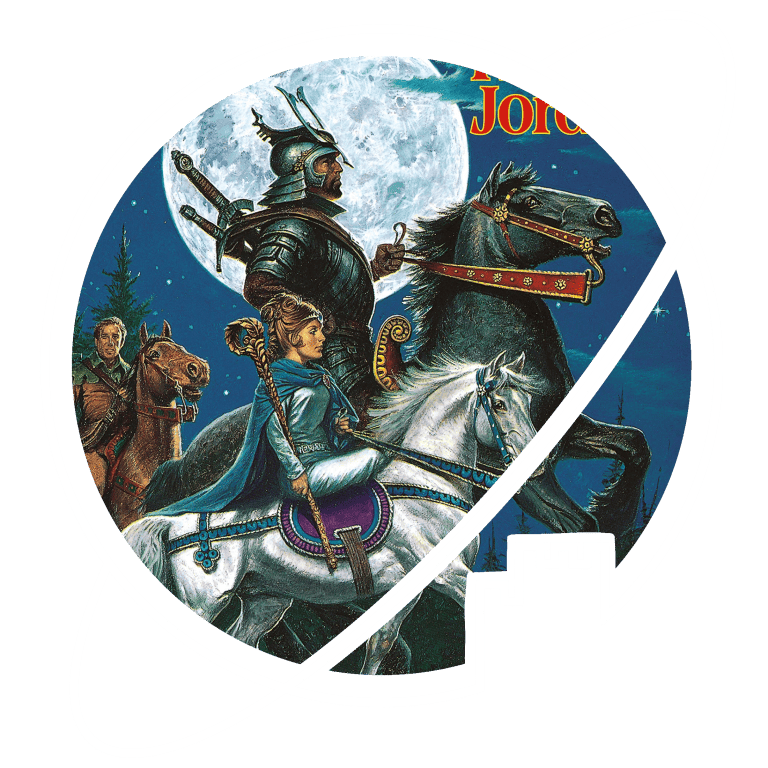
Will you look at that cover art - they don't make 'em this way no more. I wonder why.

Listened to the audiobook with Michael Kramer and Kate Reading – fine narrators.
I’m already gritting my teeth for the reactions I’m going to get, but to review is to be honest: I didn’t enjoy The Eye of the World. There. I said it.
On my Curator page, I wrote that I am a sucker for the classics. And I am. I had just never started The Wheel of Time because I always felt like the opportunity cost was too high – in other words, I could read 14 other books in the time it would take to read all of The Wheel of Time, and I’ve always believed that I would probably enjoy those 14 other books more.
I think it took five of my friends telling me to give it a go to convince me to bite the bullet. Aaaaand… I was disappointed.
The Eye of the World is not bad, exactly. It is a perfectly functional fantasy book. But that is about it. Amazingly, I found The Eye of the World to be… boring? I don’t think I’ve ever criticised any (fantasy) media for being boring before – usually, I am more about nit picks of story structure or character development. I still think there is a lot to dislike about the story’s main characters (basically, I felt only Nyneave – and I’ve had to google how to spell that because I listened to the book – is vaguely interesting as a character). But with The Eye of the World, my main struggle was just that… I didn’t really feel like listening on. I just wasn’t really interested, I just wasn’t really engaged.
I’ve tried to figure out why that is. Again, the book is not bad and the story works. My best bet is currently that there is no selling point. The Wheel of Time is so generic, cliché- and trope-ridden that it feels like an AI-generated basic fantasy tale with no life or passion to it. There is no particularly interesting setting or worldbuilding, there are no unique-feeling characters or places, no twists. The prose is fine but unremarkable. The story is a bit meandering but paced well enough not to break down.
It is just… Backward village boy from some pseudo-medieval pseudo-European land has their home invaded by evil forces, and is whisked off by a mage on a journey of discovery, only to find out he is the Chosen One? Unintentionally comically evil villains played straight? Where have I read that before?
Sometimes, you look at an older work in a particular genre and realise that the reason it feels too tropical is that it has become foundational for the genre. However, The Eye of the World feels a bit like a Tolkien ripoff in itself, so even there is no grace to be found.
In conclusion, The Eye of the World is comfortable, middle of the road fantasy that I believe should surprise or excite exactly no-one. I just cannot think of a reason to recommend The Eye of the World to anyone, other than that The Wheel of Time is one of those classics that many people think are ‘must reads’. I have started The Great Hunt, the second book, and will probably finish the first trilogy. But if you’re one of those people who say ‘but it gets good after the sixth book’, I have bad news for you.
Tagged:
See also:
Time to get to know the Escape Velocity Collection’s curators! How? By asking them the questions that really matter! Let’s see what our curators have to say…
This week’s question is:
How well would you survive in a zombie apocalypse?
Undoubtedly inspired by The Walking Dead series and Telltale video games, I used to have dreams about this scenario quite often. These dreams occurred in a period my lucid dreaming skills were at an all-time high, meaning I had enough control over my dreams to not be intimidated by armies of zombies. Dressed in my stylish long wax coat and armed with my Orcrist replica, I’d hack and slash my way through my hometown being awesome. Till this day, these dreams still belong to my favourite dreams ever.
They were dreams however. In reality, I doubt I’d have the skills to survive a zombie apocalypse for long. I might be clever enough to outrun most zombies for a time, but I’d probably lack the relentless survival instincts needed to thrive in such a world. Some nasty group of human survivors is going to be my downfall. I’d die looking fabulous, though! They won’t take that away from me.
My skills relate to standing behind a desk all day trying really hard to come up with smart things to write to judges about corporate and commercial catfights between multinationals (and every now and then I get to wear a long black gown and tell them in person). It is pretty tough to come up with a skillset that is less useful when society breaks down.
I have absolutely zilch survival experience. So the honest answer is that I would probably die a horrible death pretty soon, and even if I managed to survive the initial onslaught, I would probably starve in a month because my body is terribly inefficient with energy.
Having said that, if I managed to actually find a community of survivors where other people took care of, like, actually surviving, I could possibly make a decent warrior-type – guns are rare enough in the Netherlands that my longsword fighting (H.E.M.A.) skills might actually be of use. And the idea of chopping zombies shoulder to hip with well-placed and neatly executed Oberhauen in a 500-year old German tradition is unsurprisingly rather appealing…
Let’s be real you guys: I just wouldn’t. For me to have any chance at all, I’d need to have some notice of there being a zombie outbreak. I wear contacts and never have my glasses with me. I’m definitely never dressed for survival. When I wore my most practical shoes to hike up a mountain in Austria, a man complimented me on climbing a mountain “in heels”.
Most importantly, I don’t really see the point of living in a post-apocalyptic society. Sure, maybe some crazy survival instinct would kick in, but I’ve seen my share of zombie movies, and they’re NOT FUN!! I love life, but I love it because of all the nice things in it. I genuinely think fighting zombies wouldn’t be the worst thing in this situation: it would be the drudgery of life without any of the good stuff that civilised society has given us.
All things considered, I probably wouldn’t survive day one.
I guess it depends. If we assume that the zombie apocalypse will be caused by a virus as is the case in many scifi stories, then I think we can also assume that just as with real world pandemics, rich countries will be affected very differently than poor countries. I’m not saying that we would be capable enough to stop the spread of the virus here (COVID certainly has taught us that), but experience also teaches that rich countries have no problem buying up all the world’s available vaccines and such. So perhaps I would be one of the lucky ones to survive at least the start of the apocalypse – not because of any particular skill or talent on my part, but simply because I was lucky enough to be born rich and white.
That’s it: another soul-searching question answered!
Still curious? Visit each curator’s page to see what they’ve recently been up to!
Check out our reviews of the media discussed in this post here:
© 2023 – Escape Velocity – A Curated Collection of Fantasy and Science Fiction Media
Privacy Overview
| Cookie | Duration | Description |
|---|---|---|
| cookielawinfo-checkbox-analytics | 11 months | This cookie is set by GDPR Cookie Consent plugin. The cookie is used to store the user consent for the cookies in the category "Analytics". |
| cookielawinfo-checkbox-functional | 11 months | The cookie is set by GDPR cookie consent to record the user consent for the cookies in the category "Functional". |
| cookielawinfo-checkbox-necessary | 11 months | This cookie is set by GDPR Cookie Consent plugin. The cookies is used to store the user consent for the cookies in the category "Necessary". |
| cookielawinfo-checkbox-others | 11 months | This cookie is set by GDPR Cookie Consent plugin. The cookie is used to store the user consent for the cookies in the category "Other. |
| cookielawinfo-checkbox-performance | 11 months | This cookie is set by GDPR Cookie Consent plugin. The cookie is used to store the user consent for the cookies in the category "Performance". |
| viewed_cookie_policy | 11 months | The cookie is set by the GDPR Cookie Consent plugin and is used to store whether or not user has consented to the use of cookies. It does not store any personal data. |






